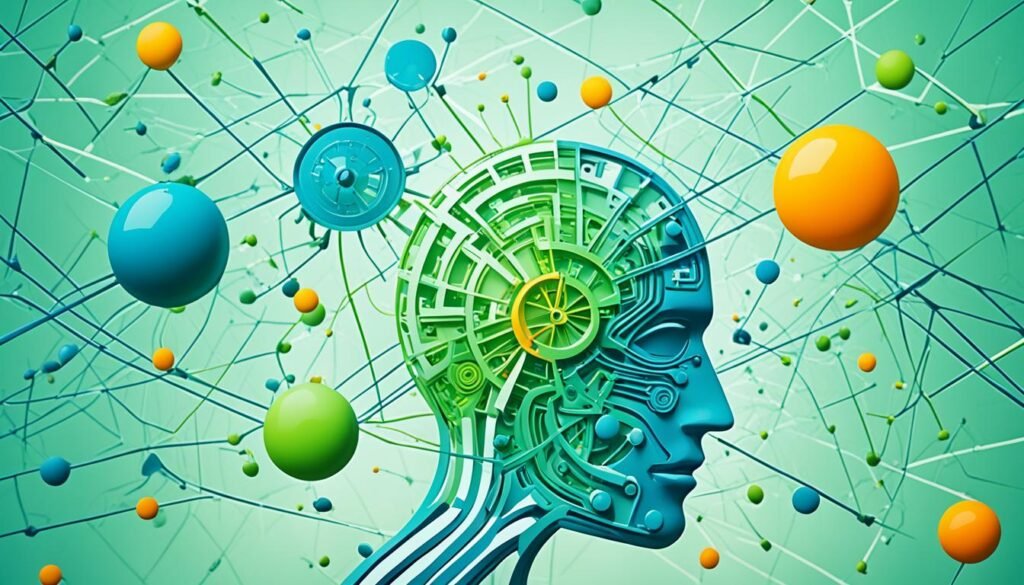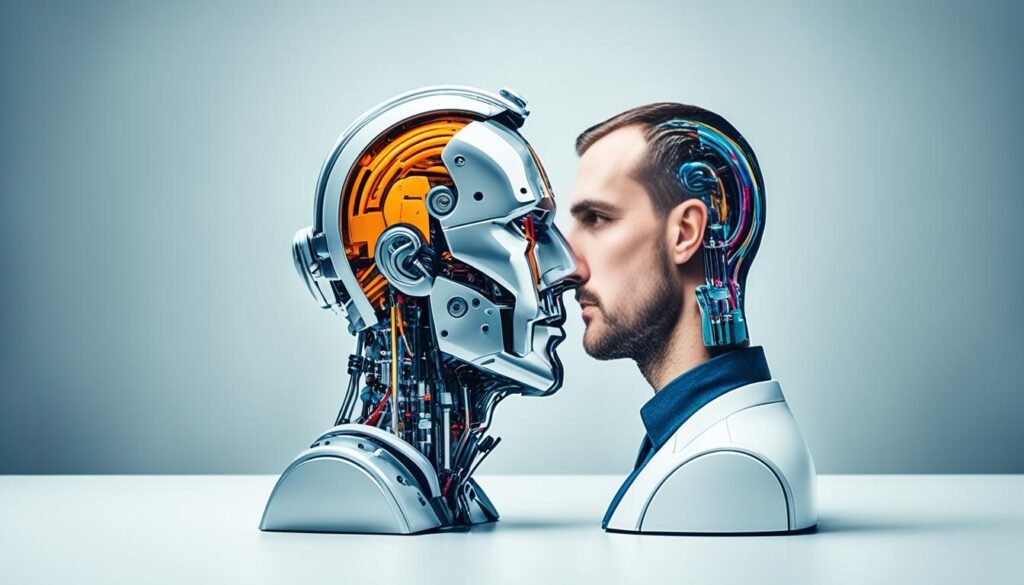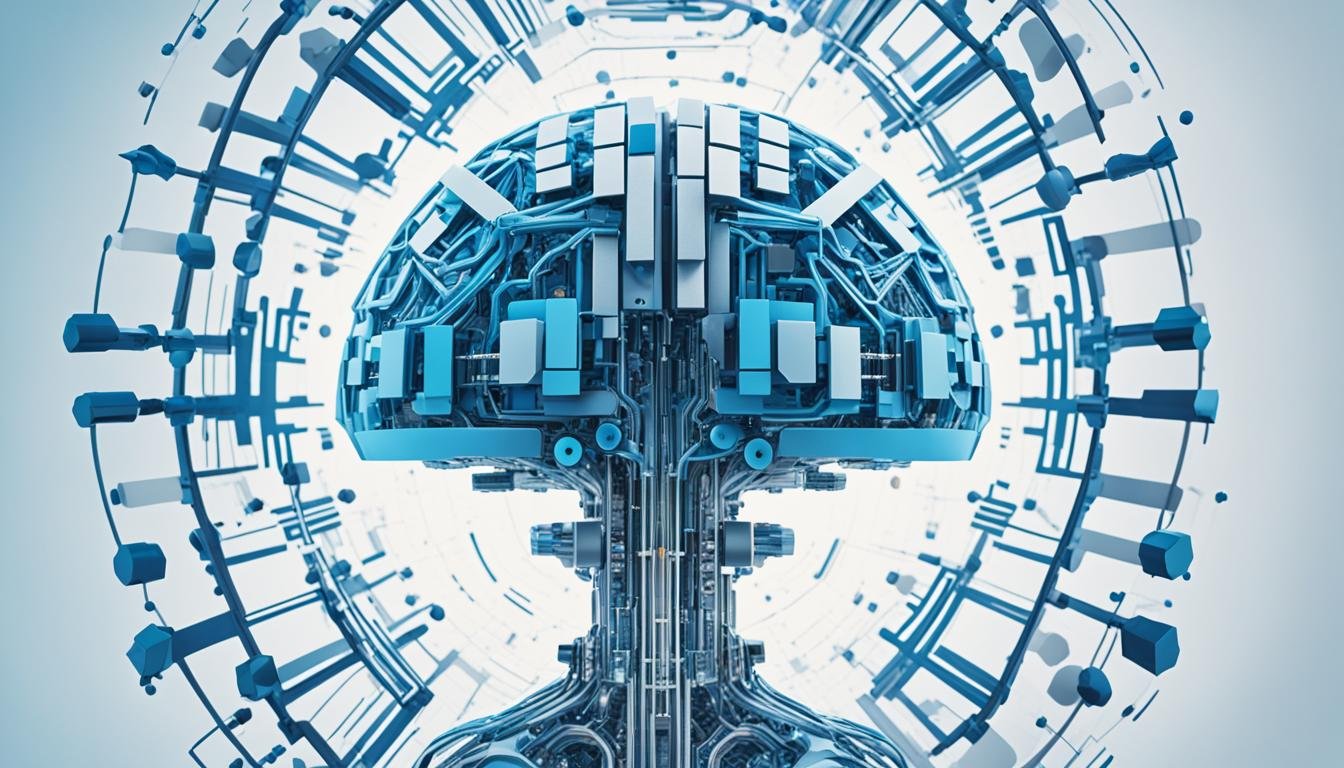AI is changing our lives fast, making us wonder: can these smart machines really make ethical choices? This year, businesses worldwide will spend $50 billion on AI. By 2024, that number could jump to $110 billion. So, we really need to think about ethics.
AI is now in many areas like retail, banking, healthcare, and government. We’re trying to teach these technologies our values and moral rules. But can AI really get the complex nature of ethics? Or will machines make choices that go against what we believe in?
Key Takeaways
- The rapid growth of AI spending highlights the urgent need for establishing ethical guidelines and principles.
- Integrating human values and moral reasoning into AI systems is a critical challenge to ensure aligned decision-making.
- Ethical AI development requires collaboration between industry, academia, governments, and other stakeholders.
- Potential pitfalls of biased data and discriminatory algorithms must be addressed to ensure fair and unbiased AI applications.
- Ongoing efforts to create global frameworks and frameworks for ethical AI governance are essential for responsible innovation.
The Rise of Ethical AI
Artificial intelligence (AI) is changing fast, making us think more about its ethics. Now, big names like IBM, Google, and Meta are focusing on ethical AI. They’re setting up teams to deal with the ethical sides of using lots of data for AI.
Groups like governments are also stepping in. They’re making rules and ethical AI principles with help from experts. The goal is to make sure AI reflects our values and respects our moral compass.
Imparting Human Values on Machine Learning Systems
Getting AI to act in a way that’s good for us is key. This means adding things like fairness, transparency, privacy, and accountability to AI’s decisions. Experts are working hard to turn human values into something AI can understand. They want AI to make choices that match our moral standards.
| Key Ethical AI Principles | Description |
|---|---|
| Fairness | Ensuring AI systems do not discriminate or perpetuate biases against individuals or groups |
| Transparency | Providing clear explanations for the decision-making processes of AI systems |
| Privacy | Protecting the personal data and privacy of individuals used in AI training and deployment |
| Accountability | Establishing clear responsibility and oversight for the actions and outcomes of AI systems |
The growth of ethical AI needs teamwork between tech experts, ethicists, policymakers, and the public. Together, they can make sure AI is developed and used in a way that respects our values and principles.
AI Decision-Making and Ethical Dilemmas
AI systems are getting smarter and play a big role in our lives. They make decisions that can affect us a lot. This has brought up big ethical questions, like AI choosing profits over people or affecting some groups more than others. We need to understand the risks and challenges of AI making decisions.
Companies are using AI more in things like hiring, scheduling, and helping with customer service. New AI models like GPT-3 and GPT-4 show how AI is becoming a big part of business.
But, using AI raises big ethical questions. People talk about “ethical AI” and “responsible AI.” Governments and companies are making rules for ethical AI use. These rules focus on fairness, being clear, and being accountable.
Some people doubt these rules, saying they don’t really help stop bad AI use. They worry about “ethics-washing” and “ethics-bashing.” The focus is often on the results, not the reasons behind the decisions.
Many think AI can make ethical choices on its own. But, making ethical decisions is more complex than just getting good results. It’s about having moral agency, good intentions, and being responsible. We need to look deeper into ethical decision making AI and ai ethical reasoning. This way, AI can work with our values and principles.

“The challenge with AI ethics is that it’s not just about optimizing outcomes, but about moral agency, intentions, and responsibility. We need to rethink how we approach ethical decision-making in the age of intelligent machines.”
Navigating the Ethical Complexities of AI
Artificial intelligence (AI) is changing our world fast. It has big benefits but also brings tough ethical issues. We need to find a balance to make sure AI is used right.
Addressing AI Fairness, Accountability, and Transparency
Ensuring AI is fair, accountable, and transparent is key. AI can sometimes make things worse by using old biases. Laws like the Algorithmic Accountability Act of 2022 in the U.S. and the EU’s Artificial Intelligence Act are trying to fix this.
Fixing bias and making AI clear requires a diverse team. Companies are also working on better governance and explainable AI (XAI). This makes AI decisions easier for us to understand.
Navigating the Ethical Landscape of AI Applications
AI’s ethics go beyond just fairness and transparency. They include privacy, autonomy, and who is responsible. With more AI around, we’re worried about our privacy and how our data is used. Laws like the EU’s GDPR try to protect us.
AI systems that can make decisions on their own, like self-driving cars, bring up new questions. We need clear rules to make sure these technologies are ethical.

Dealing with AI’s ethics needs a wide view. We must think about different views and challenges. By balancing AI’s good and bad sides, we can use it for the better while keeping our values.
can ai understand ethics
Can AI really get ethics? This question is key in the debate about AI’s ethics. As AI gets better, we need to see how well it can understand moral rules, ethical problems, and human values. We look at can ai understand ethics and ai and moral philosophy to see what AI can and can’t do in ethics.
Ray Kurzweil, a big name in the future, says smart machines will beat humans by 2029. But Stephen Hawking warns that once we make full AI, it could change itself too fast. This could be a big risk to our world, as Elon Musk also says.
In self-driving cars, Germany’s Ethics Commission suggests adding ethical values to keep humans safe first. This shows how important it is to make AI think ethically. Projects like MIT’s Moral Machine are trying to teach machines to make better moral choices with help from people.
But, neural networks are very complex and hard to check by humans. This makes it tough to make sure AI is truly transparent. It makes us wonder if AI can really understand ethics and match human values.
“As AI systems become more advanced, there is a growing need to explore the extent to which they can comprehend and reason about moral principles, ethical dilemmas, and the complexities of human values.”
The debate on ai and moral philosophy shows the big challenges and risks of using AI in our lives. AI’s benefits are clear, but we must look closely at its ethics. We need to make sure AI really gets and respects human ethics and values.

Perspectives on AI Ethics
Fairness, Transparency, Privacy, and Accountability
The world of ai fairness accountability transparency is always changing. It brings up many different views that we must think about carefully. Making sure AI is fair and doesn’t show bias is hard. This is because bias can sneak into the data used to train AI and affect its decisions.
We need to make AI systems clear and open, but we also have to remember they’re complex. Privacy issues come up when we use personal data for ethical ai projects. It’s important to find good ways to handle these concerns.
Companies are working on making AI more automated and based on data. But, this can lead to problems if the research isn’t done well or if the data is biased. Not being careful with ai morality can cause big problems, like damage to reputation, legal trouble, and big fines.
Researchers use the Belmont Report to guide them in making AI ethical. This report has three main principles: Respect for Persons, Beneficence, and Justice. These principles help guide how to make and use AI in an ethical way.
“Challenges in AI ethics today include issues related to foundation models and generative AI, technological singularity, AI’s impact on job market, privacy concerns, and bias and discrimination in AI systems.”
To solve these ethical problems, we need a plan that includes ethical rules, putting ethics into AI, and designing with values in mind. Working together between companies, schools, and those who make laws is key. This way, we can make sure AI is developed and used in a way that respects fairness, openness, privacy, and accountability.

Ethical Challenges in AI Applications
The growth of ethical AI touches many areas of life, like healthcare and finance. It faces big moral issues. These include the risk of AI-driven decisions causing unintended problems, using AI for bad things, and the harm to the environment from AI systems. We need to understand how AI affects society and work on making AI that cares for human well-being.
One big worry with AI applications is the uncertainty in how they make decisions. The way they link data to decisions is not always clear. This can lead to unfair outcomes and discriminatory effects that hurt some people and groups more than others. Also, the way AI systems work is not always clear, making it hard to know who is responsible for their actions.
AI changes things in big ways, making us think about our freedom and privacy. As AI-driven decisions become more common, we worry about losing our control and how our privacy changes. This affects not just our personal privacy but also how groups of people are treated.
| Ethical Concern | Description |
|---|---|
| Epistemological Concerns | Uncertainty in how AI uses data and makes decisions. |
| Normative Concerns | AI’s lack of clear explanations for its decisions. |
| Inconclusive Evidence | AI’s limits in making reliable and neutral decisions. |
| Inscrutable Evidence | Questions about whether AI’s actions are right and if they could be unfair. |
| Misguided Evidence | AI’s impact on society without clear ethical guidance. |
| Unfair Outcomes | Issues in tracing responsibility for AI’s actions. |
As AI technology gets more popular, we must tackle these ethical issues. Understanding the impact of AI on society and creating strong rules for ethical decision-making is key. This way, we can make AI systems that focus on people’s well-being and match our values.
Towards Ethical AI Governance
As AI grows worldwide, we need strong ethical rules. We must make AI with ai fairness accountability transparency in mind. This means working together to make sure AI helps everyone, not just a few.
We need governments, groups like the UN, and companies to work together. They should create rules that everyone agrees on. This will help use AI in a way that’s good for all of us.
Collaboration and Global Frameworks
Creating ethical AI needs a global plan that everyone agrees on. We must talk openly and work together. This way, we can make sure AI respects human rights and helps society.
We need to think about many things, like keeping data safe and making sure AI is fair. We also need to make sure AI’s benefits are shared fairly and people still have control over their lives.
To make collaboration and global frameworks for ethical ai, we need to listen to everyone. People from different fields should work together. This way, we make sure everyone’s voice is heard.
By agreeing on ai fairness accountability transparency principles, we can make a strong AI governance plan. This might mean setting global standards and checking on each other to stay honest. With this teamwork, we can make AI that’s good for everyone and protects our rights.
Cultivating AI Ethics Through Education and Awareness
As AI becomes more common, it’s vital to teach people and those making AI about ethical AI principles. This ensures AI benefits us all and respects our values. It also keeps people’s well-being in mind.
Teaching about AI fairness, accountability, and transparency is key. We need programs that teach these AI ethical principles. This way, students, teachers, and developers know how to handle AI’s ethical sides.
Talking and working together between tech experts, ethicists, and social scientists is also important. This helps connect theory with real-world AI use. It leads to better ways to make and use AI responsibly.
Knowing about AI’s ethical sides is crucial for its future. By teaching people to make choices based on ethical AI ideas, we can make AI work for everyone. This way, AI’s big changes will help humanity, not just a few.
| Statistic | Relevance |
|---|---|
| 2020: England A-level downgrades impacted pupils from disadvantaged areas the most. | Shows why AI must not make social problems worse, especially in schools. |
| 61–65: Emerging challenges in AI and the necessity for AI ethics education in the field. | Points out the need for ethical AI learning in AI work. |
| 2019: Constructionism, ethics, and creativity development in AI education at primary and middle schools. | Shows how early AI education in schools is valuable. |
| 2018: Can artificial intelligence improve learning, affecting teaching methodologies. | Points out AI’s potential in education and the ethical issues it brings. |
By teaching ethical AI and making people aware, we can help them make smart choices. This leads to better AI development. It ensures AI’s big changes help everyone, not just some.
Conclusion
The world of artificial intelligence (AI) is always changing. This means we must always think about ethics when making and using AI. The path to ethical AI is complex and needs everyone’s help.
We can work together to make AI that matches our values and helps everyone. Talking about can ai understand ethics and ai morality shows we need to keep thinking about AI’s ethics. It’s key that AI values what humans do to be responsible.
Teaching people and making them aware helps us talk about AI’s ethical sides. This way, we can make better decisions about AI. By understanding these issues, we can make AI that improves our lives and keeps us safe.
FAQ
What is ethical AI?
Ethical AI means using moral rules to make sure AI is developed and used right. It’s about adding human values to AI to make sure it reflects our values and morals.
How can AI decision-making lead to ethical dilemmas?
AI makes decisions that can affect people’s lives in big ways. For example, it might choose economic gains over human life or affect some groups more than others. Understanding these issues is key to handling AI’s ethical side.
Can AI truly understand ethics?
The question of whether AI can really get ethics is a big one. As AI gets better, we’re looking into how well it can understand moral decisions and human values.
What are the key ethical challenges in AI development and deployment?
AI faces challenges like making sure it’s fair and unbiased, being clear and understandable, protecting privacy, and being accountable. We need to tackle these to make sure AI is used right, protecting human rights and doing good.
How can we foster a culture of ethical AI?
We need to teach more people about AI ethics and work together across different fields. Creating educational materials, working together, and helping people make smart choices about AI can help. This way, AI can benefit everyone while respecting our values and caring for people.
